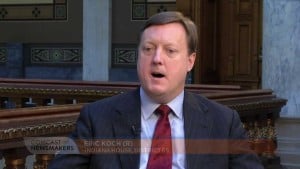During the first two months of 2015, anti-solar legislation, HB 1320, was gaining momentum. The legislative process culminated when a committee voted 9-4 on February 19 to advance the bill to the full chamber. Five days later, the bill, which would have charged a monthly fee to customers with solar panels, was pulled off the legislative calendar. House Speaker Brian Bosma said, “There are a whole variety of issues that have arisen around it and it just seems to be a little weighty.”

Rep. Eric Koch
Bosma was likely referring to the fact that journalists began questioning the financial ties of the sponsor of the bill, Representative Eric Koch, has to fossil fuel companies. Bosma could have also been referring to the fact that a hundred plus people filled the committee room to voice opposition to the bill, whereas only the utility industry spoke in favor.
The utility industry used the Indiana Energy Association (IEA), an organization that the utilities themselves are members of, to push for the bill’s passage. Mark Maassell, president of IEA, testified in favor of the bill, in addition to writing an opinion piece explaining the utility’s point of view and asking citizens to visit www.electricfairness.com, which is now defunct.
Another issue to which Bosma might have been referring to was, and continues to be, the growing pressure of public records requests by the Citizens Action Coalition (CAC) and E&PI. Rep. Koch and the Indiana Republican Caucus rejected the requests several times despite the Public Access Counselor, Luke Britt, issuing an opinion saying that the state legislature is subject to the public records law. CAC, E&PI, and Common Cause Indiana have since filed a lawsuit against the Indiana House Republican Caucus and Rep. Koch for violating the Indiana Access to Public Records Act.

